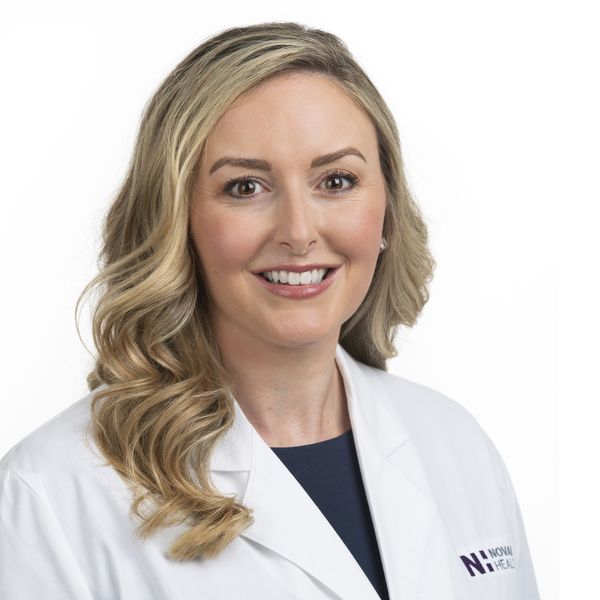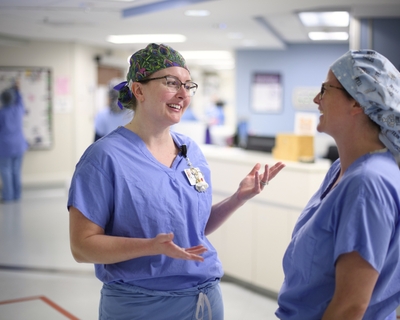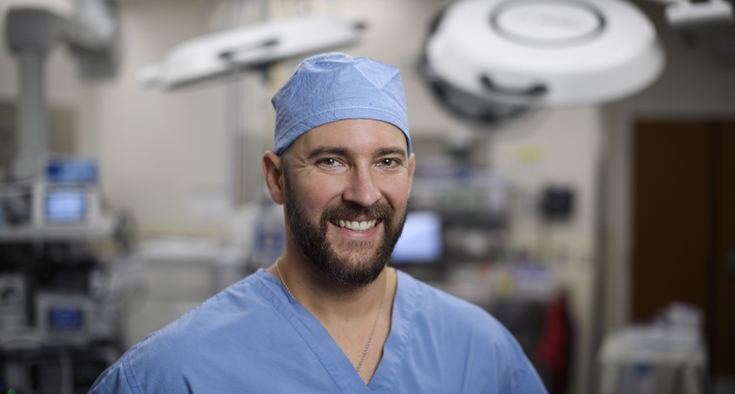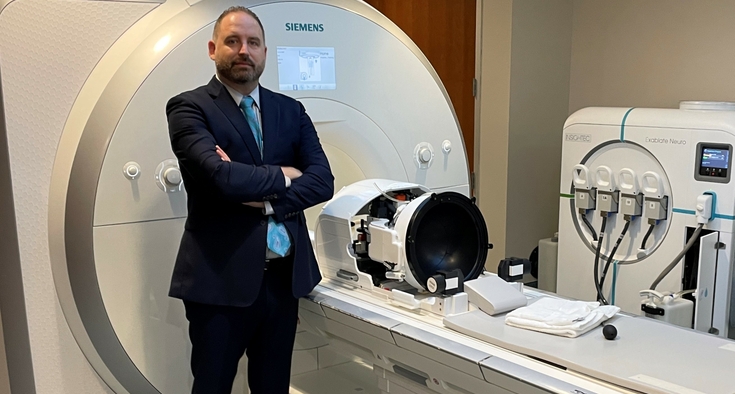Why would someone pick a medical specialty with the most complex, grueling training? For Dr. Kelly Ryan Wackerle, neurosurgeon and neurological spine surgeon at Novant Health Spine Specialists - Randolph Road in Charlotte, that was part of the appeal.
Here, Wackerle (pronounced Wack-er-lee) describes her journey* to neurosurgery, what she does right before a surgery, and the personal health story she usually doesn’t share with patients.
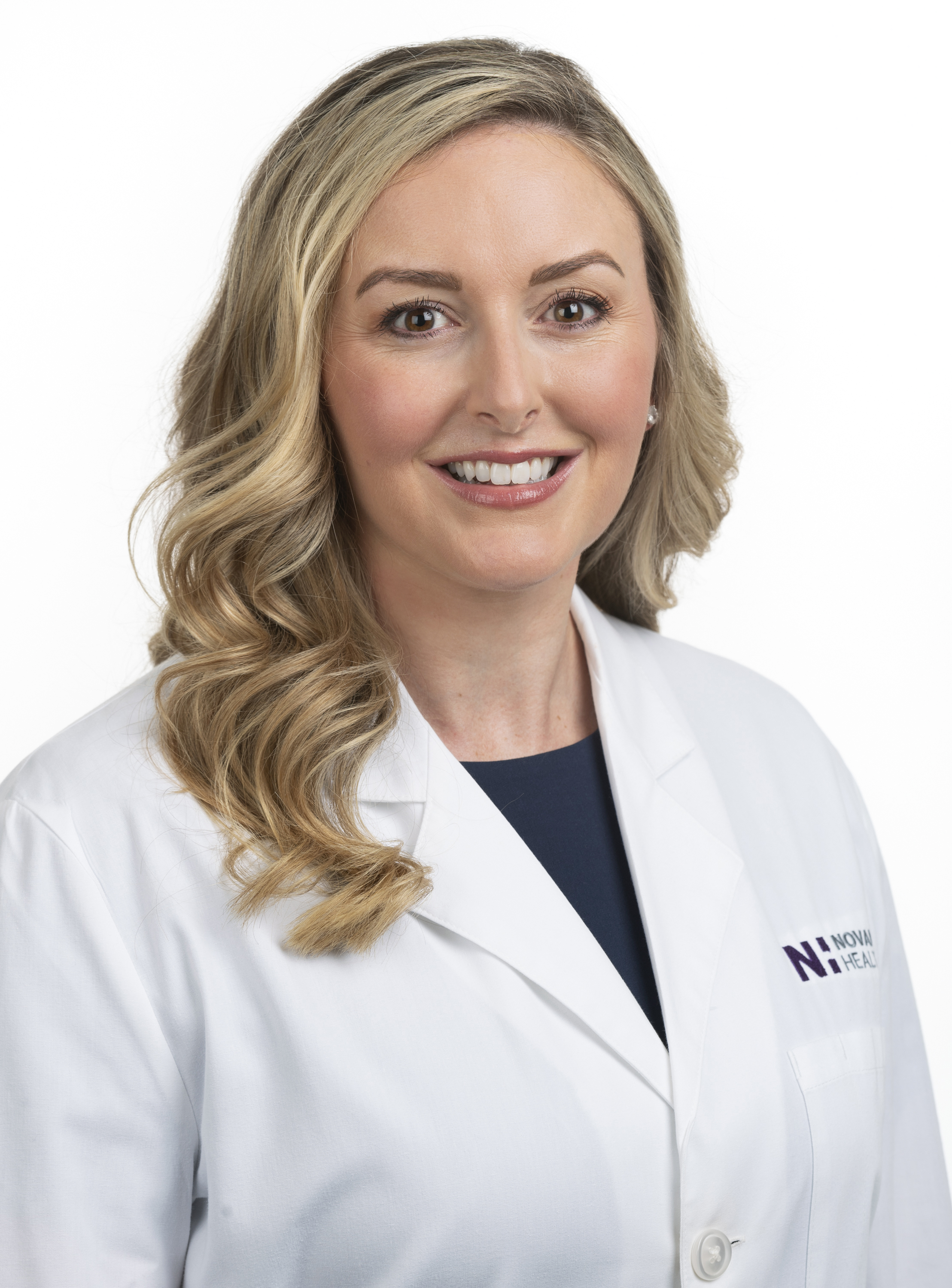
“Neurosurgery wasn’t on my immediate radar when entering medical school. I had majored in neuroscience as an undergraduate, but I thought that would bring me to a specialty like neurology or geriatrics to focus on caring for dementia patients.
“Then during medical school rotations, I started to see the calm and order that the operating room can have. Everything is in a controlled environment. Everyone has their purpose. People are all motivated towards the same goal. Surgeons work tirelessly to perfect their craft and achieve results for patients.
Exceptional, personalized neurologic care.
“In the operating room, you can see the results of your efforts in essentially real time, and immediately after surgery as the patient recovers. You witness and affect people’s lives in a very tangible way. I explored different surgical specialties, trying to find something else that felt as fulfilling as neurosurgery. But neurosurgery seemed to encompass all of my interests. In the end, it felt like something I couldn’t resist.”
Neurosurgery is one of the longest residency trainings of any medical specialty. But the challenge was appealing to Wackerle despite that investment. “Working hard seemed like a given in life, so I might as well do the hardest specialty — the one that seemed the most interesting, with the most complexity.”
Growing up in Glendale, Arizona, Wackerle was raised by a single mom, and her grandparents and extended family played a large part in her life. “Seeing how hard my mom — who was a high school chemistry teacher — had to work to support her two children was entirely motivating to me and my sister, showing us that we would have to work hard to make a life for ourselves.
“Our mom was adamant that life shouldn't be about what you can do for yourself, but what you can do for others, and that we should find a calling as opposed to just a job.” This mentality is what led Wackerle’s older sister to pursue her own calling as an Army officer after graduating from the United States Military Academy at West Point.
When she was 12, Wackerle started volunteering in the hospital in her grandparents’ retirement community. “I greeted patients, helped them find where they needed to go, worked in the child development center, took out trash, wiped down the clinic rooms, talked with patients. I saw the inner workings of a hospital, and I felt like the hospital was a home. That mindset certainly came in handy later in neurosurgery training when the hospital basically is your home!"
The training to be a neurosurgeon is 7 years after medical school. “I had to remind myself that in these strenuous days, I was making a difference, whether I was an intern, a chief resident, or a fellow. Getting a blanket for a patient, or reconciling a medication list might seem inconsequential, but small acts of service and connection with patients are critically important in a young doctor’s skill-building and development. Eventually the magnitude of help was greater – like correcting someone’s spinal deformity or removing a glioblastoma stage IV brain tumor. But the steps along the way are important. You have to take it one day at a time. You have to walk before you run; you have to understand patients before you can operate on them.”
It’s not always a given that people finish neurosurgery training. “There’s always going to be commentary, like ‘Oh, can she do it? Is that resident good enough?’ My mom reminded me to keep my eyes on my goals and to try to ignore any chatter. She told me, ‘People can say whatever they want about you; it’s what you do that matters. Put your head down and get to work.’”
“In training, the most gratifying feeling was going home thinking, ‘Wow, I just did something I had never done before.’ When you have that feeling of complete and total, ‘I gave it my full mental energy, my full physical energy, my full emotional investment — I gave it my all.’ That full self-depletion was an unmatched feeling I found in neurosurgery.”
In neurosurgery, you train your mental fortitude too. “I was an athlete in high school — playing volleyball and basketball — and a skill that athletics taught me was mental rehearsal. Day-to-day I’m thinking a lot about my patients, rehearsing surgeries in my head. As I’m falling asleep, I’m rehearsing, envisioning the steps and anticipating what might occur. That mental rehearsal is important to perfecting a hands-on skill.”
How do neurosurgeons sleep at night, knowing surgeries carry risk of complications? “I trust my training. During a career, every surgeon will encounter complications or times where things don’t go as planned. Training is designed to teach us how to manage those ‘what ifs,’ by seeing so many cases that you can say to yourself, ‘I’ve seen this before. I know how to fix this.’ The key is staying calm and collected.”
Wackerle notes that some of her inner calm comes from her reliance on her faith. “I say a prayer for my patient while washing my hands before surgery — it helps me know that I’m not in the operating room alone.”
Every operating room holds a “time out” to go over safety checklists before an incision is made. Wackerle says she adds a step: A moment of intention. “It’s something I learned from an orthopedic spine mentor, Dr. Melissa Erickson — I recite the patient’s name, any personal details that seem pertinent — like that they’re a firefighter or they’re a grandmother. I say why they’re here and add any other detail that’s unique to the case. Then I say, ‘Thank you, everybody, for being here today.’
At that moment, I reset everyone around a common goal: It’s all about this patient, their problem, and it helps us all to see the patient as a human who could be our neighbor, a friend, a real person. We’re treating and operating on a real person … and remembering that we are healthcare professionals who have a very unique, intimate role.”
Wackerle enjoys following her patients over time — to see how their lives change and to make sure they continue to do well. “I love to hear when a patient can get back to work. For our younger patients, sometimes surgery means they’re able to grow their family, or for our older patients, maybe now they can play with their grandkids again instead of just watching them. Since my grandparents played such a large role in my life, that one really resonates with me.”
There’s also one interesting fact that Wackerle tends to keep to herself: “When patients are in my clinic, I’m focused on their needs, so I don’t want to make it about me — but during residency, I needed spinal surgery myself. The impact of having experienced a problem that I treat every week is profound because I was the patient. I know what it’s like to be in constant pain. I absolutely understand what it feels like to go through the nonsurgical options and not find relief. I understand how important getting back to work feels to my patients, because it was so important to me.”
“I also understand firsthand that spinal surgery can be a solution. Surgery completely changed my life: I was no longer in pain, and my issue was fully resolved. When people show up in my office, they’re often at the end of their rope, feeling like they’re at a dead end in life. I remind them: This isn’t a death sentence, it’s not a forever problem. It’s a real problem, but it doesn’t mean that you give up. It might be a pause, but then you come back better. I did.”
* As told to Sarah Bonnema
Outside the OR
In 2023, Wackerle married Doug Wackerle. They met during their freshman year at Duke. At the time, they were strictly friends who went their separate ways for medical school, until they reunited during their medical residencies at Duke. Romance bloomed when he invited her to his anesthesiology holiday party.
He finished his training as a cardiac anesthesiologist two years before her and started working with Providence Anesthesiology Associates in Charlotte. Based on his positive experience working in Novant Health surgical facilities and with the neurosurgeons at Novant Health, he encouraged his wife to interview for the spine surgeon position. She is happy he found a city and hospital system where they can grow personally and professionally.
The Drs. Wackerle family has grown to include their toddler, who keeps them on their toes, and their high energy sheepadoodle (named Atlas after Wackerle’s favorite bone in the spine). You may find them outside of the hospital at the dog park, the golf course, or the local workout studio (“Pilates, barre, or yoga is critical to keeping your spine healthy. I swear by it!”).
“Having the ability to see a female surgeon adds choices for the patient,” Kelly Wackerle said. Although nationally, only about 10% of neurosurgeons are women, Novant Health also has a female pediatric neurosurgeon, Dr. Erin Kiehna. Kelly Wackerle appreciates that there is another female neurosurgeon in the group: “She’s both a friend and a mentor — more often though, we are comparing notes on motherhood!”
In an average day, Kelly Wackerle doesn’t just play the role of a surgeon; she also needs to be a listener, a motivator, an educator for patients’ family and friends who will support them after surgery, and a counselor helping patients weigh their options.
According to her mentor, those bonus roles are where Kelly Wackerle sets herself apart from other surgeons. “Dr. Wackerle is an outstanding physician, surgeon and human being. She always was prepared for surgery, was always great in surgery and was always attentive to the patients' and their loved ones' needs after surgery,” said Dr. Muhammad Abd-El-Barr, who helped train her at Duke. “What sets Dr. Wackerle apart from others is her deep caring for the welfare of her patients. It is that deep caring that pushes her to clinical and surgical excellency.”




